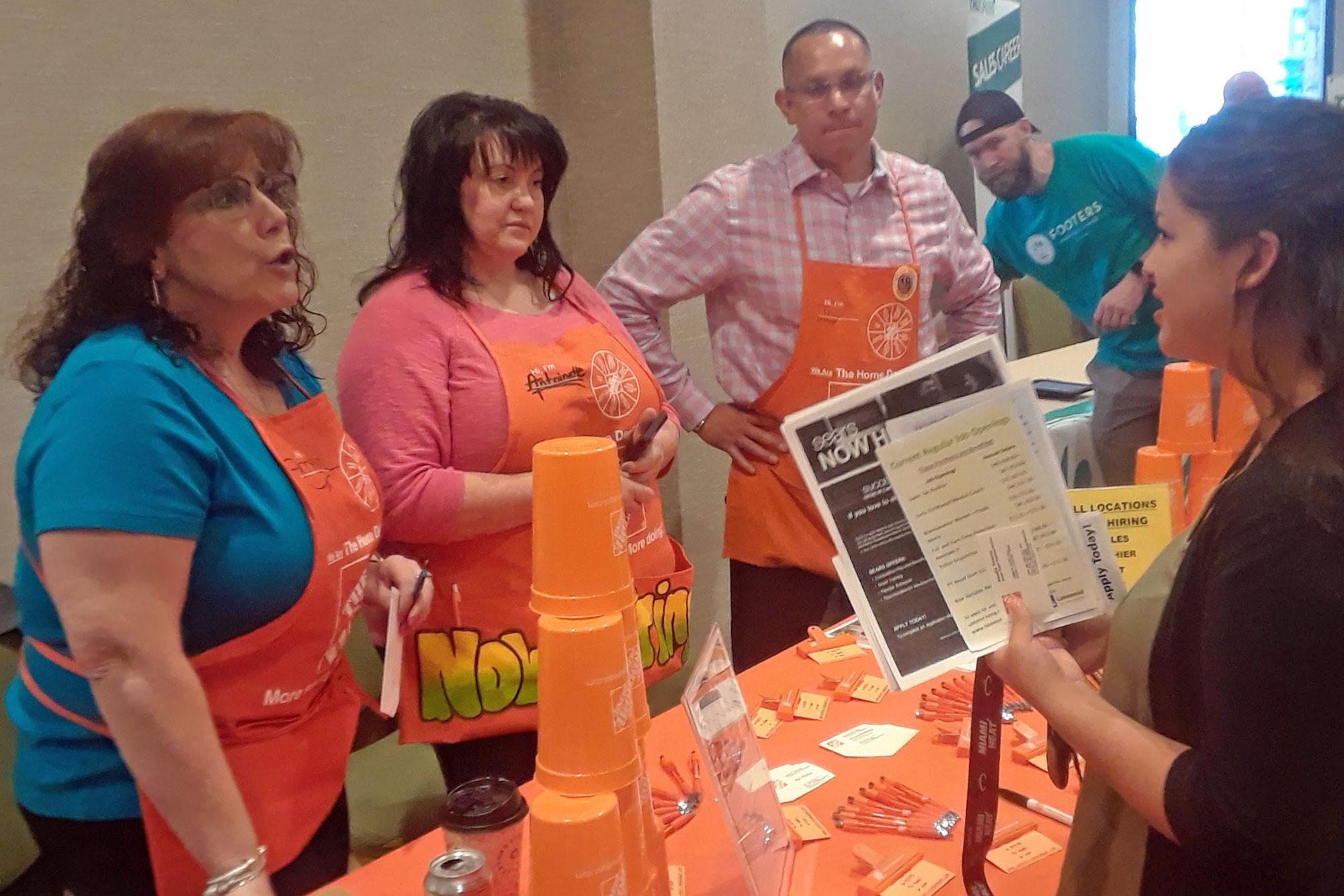
Ayla Winger was two days into training at It’s Sugar, a candy shop at Lakewood’s Colorado Mills Mall, when she said “all hail broke loose.”
The ferocious May 8 hail storm cracked the roof of the mall. Water poured into the shop. Winger and other staff tried to save the merchandise with sheets of plastic. She salvaged some, but said she ended up having to throw out around a literal ton of wet candy.
Her job also dissolved. The company offered to transfer her to another It’s Candy location in downtown Denver. She declined because the location was too far from her son’s daycare.
“This one threw a curveball at me,” she said. “I’ve already run through all my savings.”
That’s how Winger ended up at the job fair for displaced mall workers. Twenty-five companies gathered in a hotel conference room near Colorado Mills Wednesday looking for job applicants to fill open positions. The American Job Center, which helped organize the event, said more than 100 employers in the Denver Metro applied to join.
That level of interest is likely good news for Colorado retail workers, who could be in store for a much larger, economic storm.
Online sellers like Amazon have long been a threat to brick-and-mortar retailers. Economists now see signs the contest may have reached a tipping point.
“It used to be we didn’t worry about it because online sales were such a small slice of the pie,” said Stephan Weiler, an economist at Colorado State University. “People have been really astonished by how quickly that has been going up.”
2017 already hasn’t been kind to brick-and-mortar retailers. The clip of U.S. store closures is on pace to surpass total closures in 2008. Back then, the Great Recession forced consumers to cut back on purchases at the mall or the hardware store.
That would seem to indicate a change in consumer behavior rather than a dip in economic fortunes. In other words, retail could be in line for disruption.
The transition could take a toll on the retail job market. Merchandise stores, like Macy’s and JC Penney, have laid off nearly 90,000 workers since October. U.S. retailers have also shed jobs in each month of 2017 according to Bureau of Labor Statistics data.

Ryan Gedney, a labor economist at the Colorado Department of Labor and Employment, expects Colorado to eventually follow national trends. Even so, he said the state’s growing economy could buffer retail workers in the short term.
“In Colorado, we haven’t seen as steep of a decline in growth as the U.S., but I certainly think it’s following that pattern,” said Gedney.
Retailers in Colorado have seen their share of troubles though. Colorado-based Sports Authority liquidated in 2016, terminating thousands of jobs across the country.
Many anchor tenants of U.S. malls have also shut their doors over the last year. Following the hail storm at Colorado Mills, Neiman Marcus announced it would end its lease at the mall.
As for retail workers, Gedney is encouraged by the record 2.3 percent unemployment rate Colorado reported in April. That’s the lowest rate in the county. High demand for workers means other sectors could absorb retail workers — much as they have absorbed oil and gas workers during the recent downturn tied to oil prices.
That appeared to be the case for another retail worker, Beth Griffin. Until the hailstorm, she had worked as an assistant manager at Kitchen Collections in Colorado Mills. She said she can’t afford to wait for the repairs, which could keep the mall closed until November.
“We joke that Mother Nature laid us off,” she said.
It wouldn’t be the first time Griffin had lost a job unexpectedly. Another store closure once sent her on a two-year job hunt.
Economists say such long bouts of unemployment can have lasting consequences. Workers often struggle to return to their old levels of income.
At the job fair, Griffin was glad to see so many employers ready with applications.
“It might be easier this time because there are other positions readily available,” she said.









